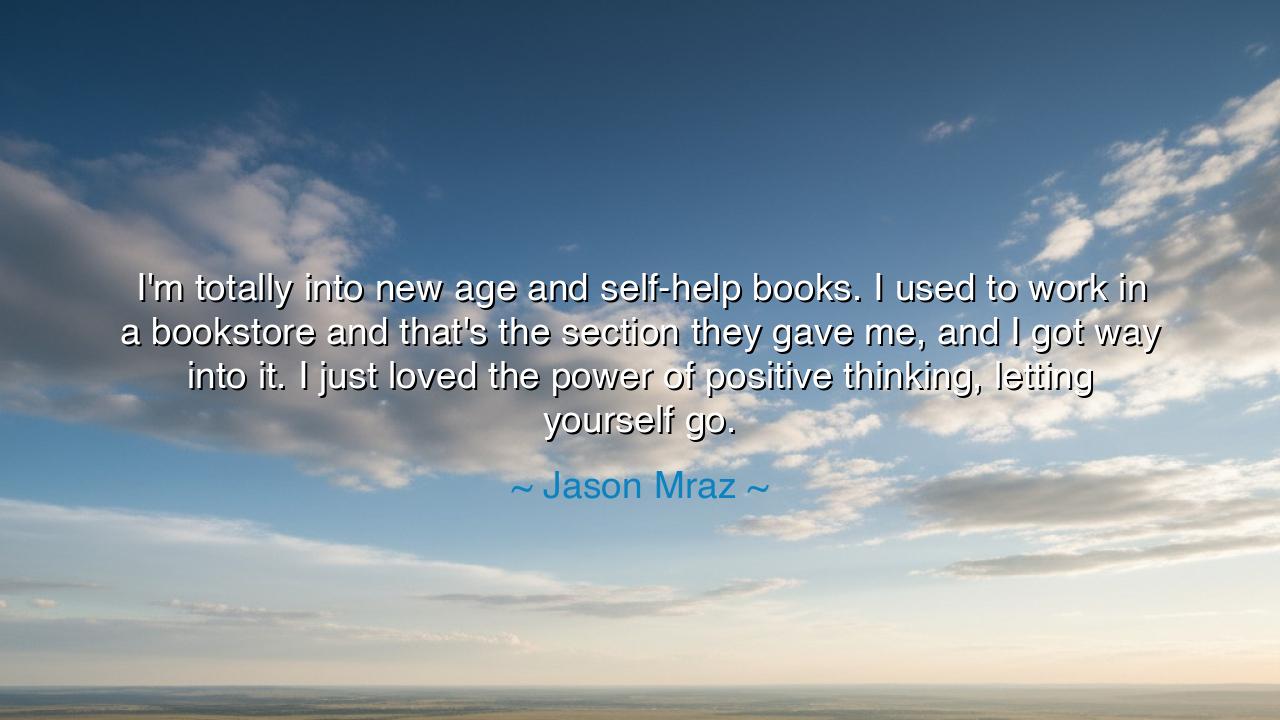
I'm totally into new age and self-help books. I used to work in a
I'm totally into new age and self-help books. I used to work in a bookstore and that's the section they gave me, and I got way into it. I just loved the power of positive thinking, letting yourself go.






"I'm totally into new age and self-help books. I used to work in a bookstore and that's the section they gave me, and I got way into it. I just loved the power of positive thinking, letting yourself go." — so confessed Jason Mraz, the troubadour of optimism, whose songs are woven with the sunlight of joy and gratitude. His words are not idle praise of paper and ink; they are a testimony to the transforming power of the mind — to the discovery that one’s outlook can shape one’s destiny. From a humble shelf in a quiet bookstore, Mraz found not only philosophy but awakening: a belief that through positive thought and inner surrender, one could live in harmony with the world, and not in battle against it.
In the style of the ancients, one might say: the soul becomes what it contemplates. Mraz’s journey into new age wisdom and self-help philosophy reflects a timeless truth known since the days of sages — that the mind is the fountain from which both joy and sorrow flow. He speaks of “the power of positive thinking,” which is not mere cheerfulness, but a discipline of perception — the art of directing the inner gaze toward light rather than shadow. The ancient Stoics, too, taught this truth: that the mind can master fortune by mastering its own thoughts. Marcus Aurelius, emperor and philosopher, wrote in his meditations, “The happiness of your life depends upon the quality of your thoughts.” What Mraz found between the pages of his books was what emperors once found in solitude — the wisdom that peace begins within.
Jason Mraz, before his fame, was a dreamer working behind the counter of a bookstore — a seeker among shelves. When he says, “I got way into it,” we hear the echo of a heart discovering its path. For the world often rushes past the quiet places of reflection, yet it is in those silent aisles of contemplation that the greatest revolutions begin. What he found there — the lessons of mindfulness, gratitude, and surrender — would later bloom in his music. Each lyric, light as laughter, carries the echo of these teachings: “letting yourself go,” not into recklessness, but into trust, into faith that life, if met with openness, will unfold as it should.
Consider, too, the story of Norman Vincent Peale, author of The Power of Positive Thinking, whose message transformed the despair of millions after the Great Depression. He preached not a hollow optimism, but a spiritual resilience — that even in hardship, the human mind could summon courage and hope. Mraz’s admiration for such teachings aligns with this lineage of thinkers who turned philosophy into daily practice. Both men, though separated by generations, spoke of the same truth: that life is shaped not by circumstance, but by attitude; that freedom comes when one surrenders fear and replaces it with faith.
Mraz’s phrase, “letting yourself go,” carries the wisdom of both mystic and musician. It means to release the grip of control — to stop resisting the flow of existence. The river of life moves, with or without our struggle; but those who relax into its current discover joy where others find exhaustion. This is the new age principle at its purest: to live in alignment with the universe rather than in defiance of it. To “let go” is not to give up, but to give in — to trust that one’s purpose, one’s rhythm, will reveal itself in time, just as the melody emerges once the heart begins to listen.
The lesson, then, is both gentle and profound: train your mind toward light, and your path will brighten. Begin each day not by asking what the world owes you, but by asking how you may think, feel, and act in harmony with life. When discouragement whispers, remember that the thought you choose next will shape your future. When fear arises, breathe, and let yourself go — release the need to control what you cannot, and focus instead on what you can: your thoughts, your gratitude, your intention.
And so, my child, heed the quiet teaching of Jason Mraz — that wisdom does not always come from the mountaintop or the temple, but sometimes from the bookshelf of a small store, waiting for the right soul to notice it. Let your thoughts be the brush with which you paint your days, your hope the music that fills them. Cultivate positive thinking not as a mask for pain, but as a path through it. For when you learn to let go — to surrender with faith and courage — life itself begins to sing with you. And in that harmony, you shall find the freedom and joy that no fear, no failure, and no darkness can silence.






AAdministratorAdministrator
Welcome, honored guests. Please leave a comment, we will respond soon